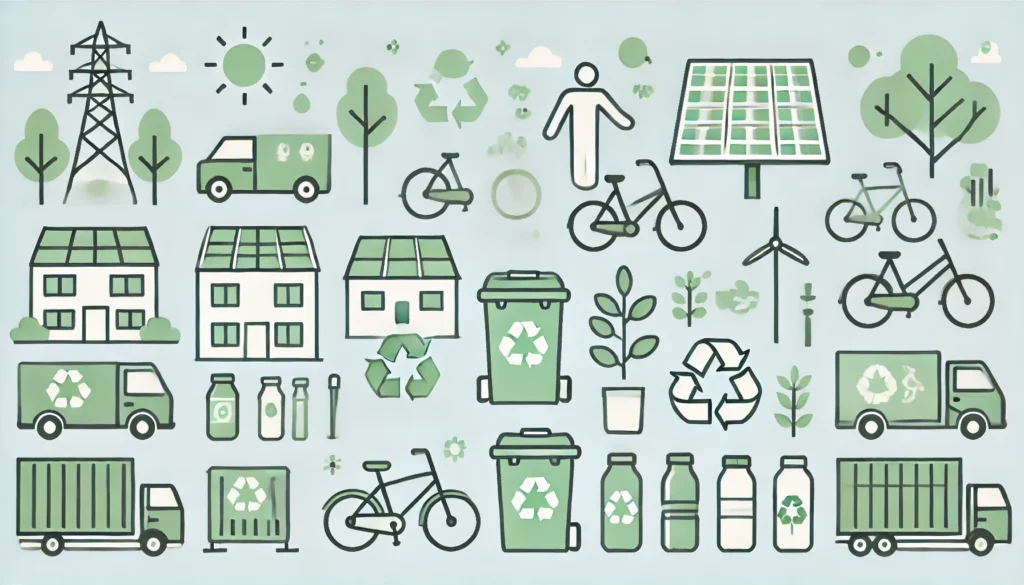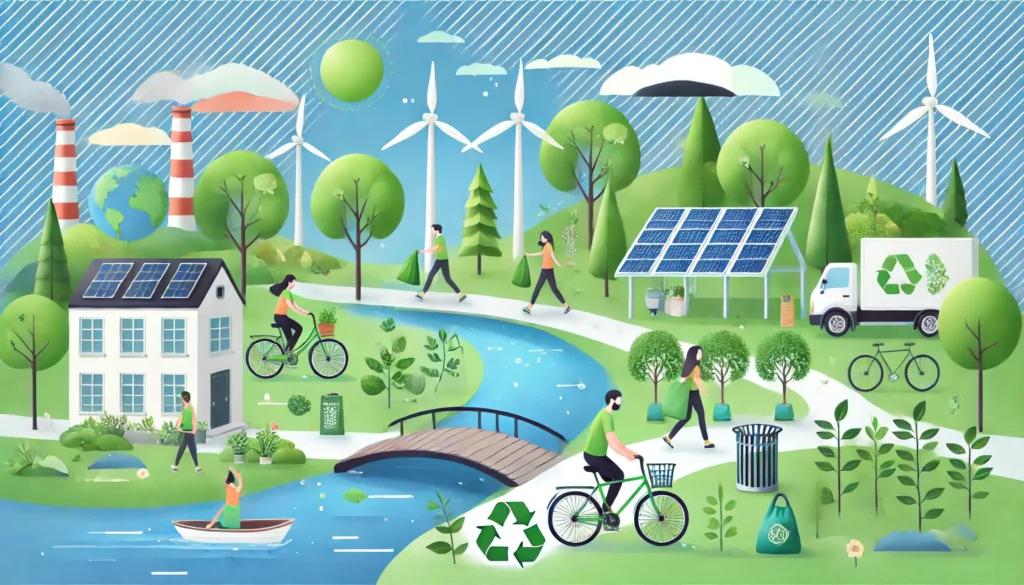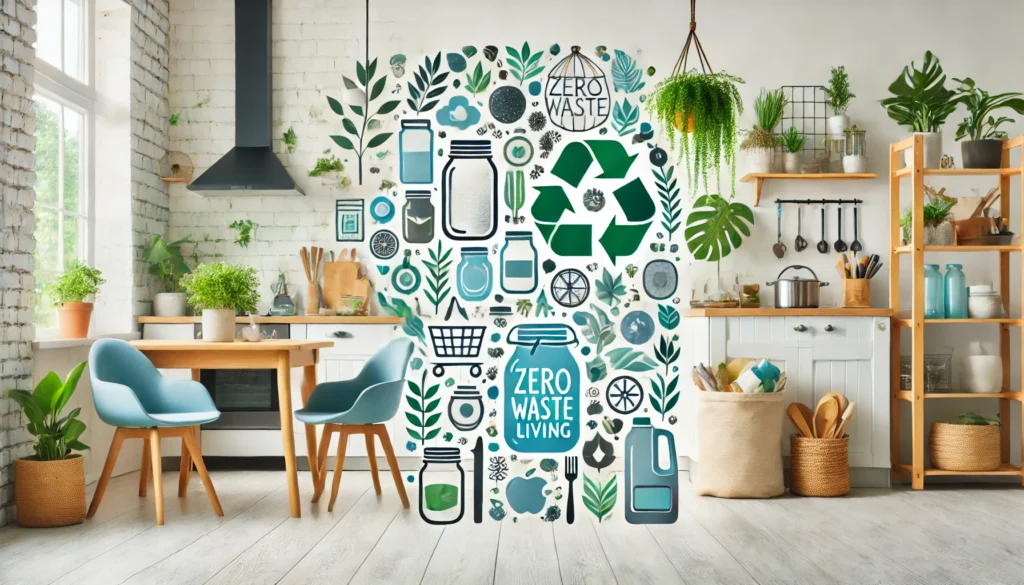Urban living can feel fast-paced and challenging, but integrating eco-friendly habits into your daily routine is easier than you think. Living a sustainable lifestyle is not only beneficial for the environment but also helps reduce your overall carbon footprint. In this blog post, we will cover 10 simple actions that can make a big difference. The best part is, these steps are easy to integrate into your daily routine and can have a lasting positive impact on the planet.
1. Opt for Public Transportation, Biking, or Walking
One of the most effective ways to lower your carbon footprint is by minimizing the use of personal vehicles. Urban areas usually offer plenty of transportation alternatives such as buses, subways, and trams. If your commute is short, consider walking or biking, which not only reduces pollution but also improves your health.
Example:
Instead of driving to work, you could take the bus or metro. If you need to go to the grocery store just a mile away, consider walking or riding a bicycle.
2. Carry a Reusable Water Bottle and Coffee Cup
Single-use plastic bottles and cups are major contributors to plastic pollution. By carrying a reusable water bottle and coffee cup, you help reduce waste and avoid contributing to the problem of disposable plastics.
Example:
Make it a habit to always have your stainless steel or BPA-free water bottle when you leave the house. Many cafes also offer discounts when you bring your reusable coffee cup.
3. Use Energy-Efficient Appliances
Energy-efficient appliances, such as refrigerators, washing machines, and air conditioners, consume less electricity, which helps reduce greenhouse gas emissions. Look for appliances with an Energy Star rating to ensure you’re making an environmentally conscious choice.
Example:
When shopping for a new washing machine or fridge, opt for one with high energy efficiency. These appliances may cost more upfront but will save you money in the long run by lowering energy bills.
4. Reduce Food Waste
Food waste is a significant problem in urban areas. By planning your meals and shopping mindfully, you can reduce the amount of food that ends up in landfills, which contributes to greenhouse gas emissions.
Example:
Plan your meals for the week before heading to the grocery store and buy only what you need. Consider using leftovers to make new meals, like turning extra vegetables into a stir-fry.
5. Switch to LED Lighting
LED bulbs use significantly less energy than traditional incandescent bulbs and last much longer. By replacing your light bulbs with LEDs, you can reduce your energy consumption and save money on your electric bill.
Example:
Swap out the light bulbs in high-traffic areas of your home, like the kitchen and living room, with energy-efficient LEDs. You’ll quickly notice a reduction in your electricity usage.
6. Minimize Single-Use Plastics
Single-use plastics, like bags, straws, and packaging, are incredibly harmful to the environment. Choose reusable alternatives, such as cloth bags, metal straws, and glass containers, to help reduce plastic waste.
Example:
Bring your reusable shopping bags to the grocery store, and say no to plastic straws when dining out. Purchase bulk items to reduce packaging waste.
7. Conserve Water at Home
Simple actions like taking shorter showers, fixing leaks, and using water-efficient appliances can go a long way in conserving water. Urban areas often face water shortages, making water conservation a crucial aspect of sustainable living.
Example:
Install a low-flow showerhead to reduce water usage, and turn off the faucet while brushing your teeth. Fix any leaky faucets or pipes as soon as possible.
8. Buy Local and Organic Foods
Urban cities often have farmer’s markets or stores that sell locally grown produce. By buying local, you reduce the carbon emissions associated with food transportation. Organic foods are also grown with fewer harmful chemicals, which is better for the environment and your health.
Example:
Visit your local farmer’s market once a week and stock up on fresh, seasonal vegetables and fruits. Not only will you be supporting local farmers, but you’ll also be eating more nutritious food.
9. Reduce, Reuse, Recycle
The 3 Rs—reduce, reuse, and recycle—are essential for sustainable living. In urban areas, where waste disposal is a challenge, recycling can significantly decrease the amount of waste sent to landfills. Make recycling a daily habit and try to reduce your consumption where possible.
Example:
Set up separate bins for paper, plastics, and glass at home to make recycling easier. Donate old clothes instead of throwing them away, and repurpose glass jars for food storage.
10. Grow Indoor Plants or Urban Gardens
Indoor plants help improve air quality by absorbing pollutants and releasing oxygen. If you have space, you can also start an urban garden to grow your own vegetables and herbs. Even in a small apartment, plants can make a big difference.
Example:
Start with small indoor plants like aloe vera or succulents that are easy to care for. If you have a balcony or rooftop access, consider growing herbs like basil or mint in pots.
Small Habits for a Sustainable Urban Lifestyle
Living sustainably in a bustling urban environment is entirely possible by making small but meaningful changes in your daily routine. By incorporating these simple habits, you can minimize your environmental impact and contribute to a greener planet. The key is to be mindful of the resources you use and the waste you create. Every small step counts towards a more sustainable future.
Discover more from Green Ecosystem - Renewable Energy, Agriculture, and Environmental Sustainability
Subscribe to get the latest posts sent to your email.


